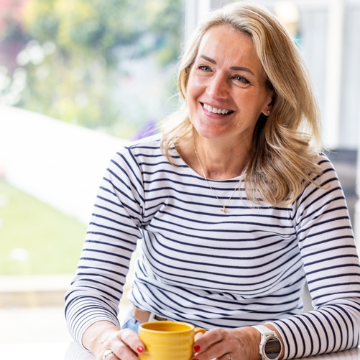How to help anxious feelings in uncertain times with Registered Nutritionist Sarah Jackson

For many the uncertainty we are all facing and the inability to plan has been a source of stress and anxiety. Especially because we know the pandemic is still here, we are having to ‘live with it’.
Whilst there is positive news about successful vaccination trials, more information is still needed. It’s no surprise that anxiety levels have increased by up to 50% according to some studies, in recent weeks.
Uncertainty is the breeding ground for anxiety
It’s common for us to feel worried or stressed as our life keeps changing and we are now seeing the economical repercussions of lockdown all over the headlines.
How can we help these feelings of anxiety and overwhelm?
Firstly start by acknowledging these feelings, being gentle with yourself and take one day at a time.
Anxiety signs and symptoms can look like feelings of tension, worried thoughts and physical changes. These feelings of anxiety and panic can interfere with daily activities, can be difficult to control.
Anxiety can feel physical in the body with heart palpitations, increased heart rate and rapid breathing, blurred vision and sleep issues. I see a lot of digestive issues show up from anxiety - think unexplained bloating, gas & loose stools. And it can cause the urge to avoid things that trigger anxiety, which might be going back to your old office or getting on the tube, at the moment.
We can look to nutrition, nature and effective lifestyle techniques to help support us both when we’re in the eye of an anxiety storm, and then manage and prevent anxiety in general.
Top 5 herbs and nutrients to help anxious feelings
Lots of people find adaptogenic herbs useful. They may help your body adapt to, and better manage stress. I find these really useful:
Supplements which include Ashwagandha such as life armour's Recharge Focus capsules and super me+ capsules.
Lemon balm is also great which can be found in life armour's Drops of Balance
Magnesium: I use and really rate magnesium which we can become low in, under highly stressful times. You can use it topically on the skin where it can be well absorbed like in epsom salt baths, magnesium lotions and sprays or via food sources like almonds, brown rice & leafy green veg, or via supplements.
life armour's super me+ also includes high levels of ionic magnesium, a high quality magnesium readily absorbed. Magnesium is well known to contribute to the normal function of the nervous system.
Gaba is an amino acid that is responsible for decreasing anxiety in the nervous system, and it may also help to relax your muscles. You can’t take it directly in this country, but passiflora can help improve gaba activity and it’s in kefir, natural bio live yoghurt & tempeh naturally.
Top tip: Adaptogens can take a while to build up and work on the body, so take them for at least two to three weeks before thinking too much about the effect.
Support anxiety through diet
Reduce inflammatory foods like refined sugars and refined carbs which have been shown to drive anxiety.
Increase anti-inflammatory foods such as wild oily fish like trout, salmon and mackerel 2-3 times a week, eggs and healthy fats like avocado and cook with extra virgin olive oil.
Balance blood sugar levels with protein at every meal, and going for whole grains like brown rice over white. They have a slower release of energy into the blood stream and can make a big difference to energy levels and can support healthy weight because they help to keep you full and satisfied for longer.
Reduce alcohol and caffeine - sorry to say it, but studies have shown that to really reduce anxiety you should avoid alcohol altogether, but certainly limiting your alcohol to 1-3 drinks a week with a max of 2 drinks in one sitting, can really help. Swap your G&T for an icy cold glass of fermented fizzy kombucha in a fancy glass Monday-Friday instead.
Go for herbal tea like Passiflora or lemon balm instead of coffee where you can
Top 5 tried and tested lifestyle tips to aid feelings of anxiousness
Mindset - think about we what we can and can’t control and remembering that you coped with change before so we will get over this and be able to cope with the next set of changes
Find three good things everyday to boost positivity - try a gratitude dairy challenge for the next 4 weeks with a friend and stick to it
Exercise really helps to burn off adrenaline when we’re in the fight or flight pattern anxiety puts us in - find something that suits you and try to move your body for at least 20 mins every day - can be dancing round your kitchen, stretching or an online yoga session
Meditation and mindfulness - even 1 minute breathing exercises a few times a day can help keep up in the rest and digest phase, reducing anxiety
Sleep - try to be in bed by 10.30 and use guided sleep meditations, the herbs mentioned above and good sleep hygiene to help. Sleep is when our bodies rest and reboot - psychological repair happens 12am-3am and physical repair happens 10p-2am so pay attention to the timings.
When to see your Doctor about anxiety
You feel like you're worrying too much and it's interfering with your work, relationships or other parts of your life
Your fear, worry or anxiety is upsetting to you and difficult to control
You feel depressed, have trouble with alcohol or drug use, or have other mental health concerns along with anxiety
You think your anxiety could be linked to a physical health problem
You have suicidal thoughts or behaviours — if this is the case, seek emergency treatment immediately
For more information on Registered Naturopath and Nutritionist Sarah Jackson, and to start Sarah's FREE 28 Fast Plan, please head to www.sjheath.co.uk.








